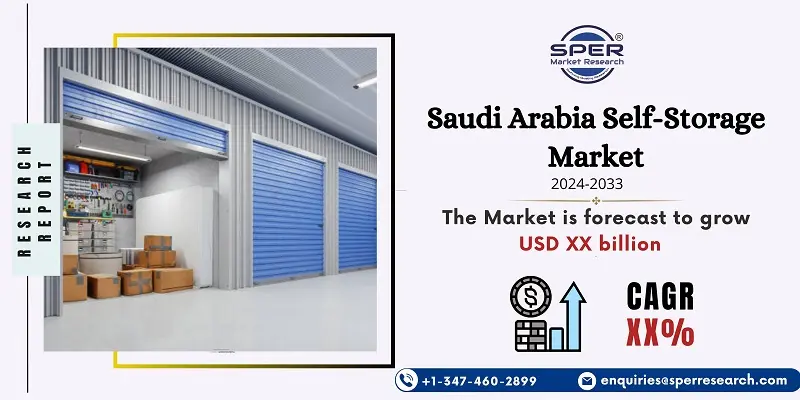
Saudi Arabia Self-Storage Market Growth, Size, Trends, Demand, Revenue and Future Outlook
Saudi Arabia Self-Storage Market Size- By Type, By Facility Type, By Application- Regional Outlook, Competitive Strategies and Segment Forecast to 2033
| Published: May-2024 | Report ID: IACT24107 | Pages: 1 - 104 | Formats*: |
| Category : Information & Communications Technology | |||
- January 2023; As part of Vision 2030, there will be more investments made in urban infrastructure projects, which will increase demand for self-storage options in key cities like Riyadh and Jeddah.
- March 2023; Foreign companies entering the Saudi market launch new self-storage facilities with advanced climate-controlled units and improved security systems.


| Report Metric | Details |
| Market size available for years | 2020-2033 |
| Base year considered | 2023 |
| Forecast period | 2024-2033 |
| Segments covered | By Type, By Facility Type, By Application |
| Regions covered | Riyadh, Jeddah, Dammam, Rest of Saudi Arabia |
| Companies Covered | WheeKeep, Makhzny Self Storage, Logexa, Mostawdae, Self-Storage, Freights Solutions Co, Beck & Pack Logistics, Sahel Storage, Four Winds, Buzyb Shipping and Others. |
- Residential Customers
- Commercial Customers
- Specialty Customers
- Event Planners and Organizers
| By Type: |
|
| By Facility Type: |
|
| By Application: |
|
- Saudi Arabia Self-Storage Market Size (FY’2024-FY’2033)
- Overview of Saudi Arabia Self-Storage Market
- Segmentation of Saudi Arabia Self-Storage Market By Type (Short-term lease, Long-term lease)
- Segmentation of Saudi Arabia Self-Storage Market By Facility Type (Temperature Controlled, Non-Temperature Controlled)
- Segmentation of Saudi Arabia Self-Storage Market By Application (Personal, Business)
- Statistical Snap of Saudi Arabia Self-Storage Market
- Expansion Analysis of Saudi Arabia Self-Storage Market
- Problems and Obstacles in Saudi Arabia Self-Storage Market
- Competitive Landscape in the Saudi Arabia Self-Storage Market
- Impact of COVID-19 and Demonetization on Saudi Arabia Self-Storage Market
- Details on Current Investment in Saudi Arabia Self-Storage Market
- Competitive Analysis of Saudi Arabia Self-Storage Market
- Prominent Players in the Saudi Arabia Self-Storage Market
- SWOT Analysis of Saudi Arabia Self-Storage Market
- Saudi Arabia Self-Storage Market Future Outlook and Projections (FY’2024-FY’2033)
- Recommendations from Analyst
1.1. Scope of the report1.2. Market segment analysis
2.1. Research data source2.1.1. Secondary Data2.1.2. Primary Data2.1.3. SPER’s internal database2.1.4. Premium insight from KOL’s2.2. Market size estimation2.2.1. Top-down and Bottom-up approach2.3. Data triangulation
4.1. Driver, Restraint, Opportunity and Challenges analysis4.1.1. Drivers4.1.2. Restraints4.1.3. Opportunities4.1.4. Challenges4.2. COVID-19 Impacts of the Saudi Arabia Self-Storage Market.
5.1. SWOT Analysis5.1.1. Strengths5.1.2. Weaknesses5.1.3. Opportunities5.1.4. Threats5.2. PESTEL Analysis5.2.1. Political Landscape5.2.2. Economic Landscape5.2.3. Social Landscape5.2.4. Technological Landscape5.2.5. Environmental Landscape5.2.6. Legal Landscape5.3. PORTER’s Five Forces5.3.1. Bargaining power of suppliers5.3.2. Bargaining power of buyers5.3.3. Threat of Substitute5.3.4. Threat of new entrant5.4. Heat Map Analysis5.3.5. Competitive rivalry
6.1. Saudi Arabia Self-Storage Market Manufacturing Base Distribution, Sales Area, Product Type6.2. Mergers & Acquisitions, Partnerships, Product Launch, and Collaboration in Saudi Arabia Self-Storage Market
7.1. Saudi Arabia Self-Storage Market Size, Share and Forecast, By Type, 2020-20267.2. Saudi Arabia Self-Storage Market Size, Share and Forecast, By Type, 2027-20337.3. Short-term lease7.4. Long-term lease
8.1. Saudi Arabia Self-Storage Market Size, Share and Forecast, By Facility Type, 2020-20268.2. Saudi Arabia Self-Storage Market Size, Share and Forecast, By Facility Type, 2027-20338.3. Temperature Controlled8.4. Non-Temperature Controlled
9.1. Saudi Arabia Self-Storage Market Size, Share and Forecast, By Application, 2020-20269.2. Saudi Arabia Self-Storage Market Size, Share and Forecast, By Application, 2027-20339.3. Personal9.4. Business
10.1. Saudi Arabia Self-Storage Market Size and Market Share
11.1. Saudi Arabia Self-Storage Market Size and Market Share By Region (2020-2026)11.2. Saudi Arabia Self-Storage Market Size and Market Share By Region (2027-2033)11.2.1. Riyadh11.2.2. Jeddah11.2.3. Dammam11.2.4. Rest of Saudi Arabia
12.1. BECK & PACK LOGISTICS12.1.1. Company details12.1.2. Financial outlook12.1.3. Product summary12.1.4. Recent developments12.2. BUZYB SHIPPING12.2.1. Company details12.2.2. Financial outlook12.2.3. Product summary12.2.4. Recent developments12.3. FOUR WINDS12.3.1. Company details12.3.2. Financial outlook12.3.3. Product summary12.3.4. Recent developments12.4. FREIGHTS SOLUTIONS CO12.4.1. Company details12.4.2. Financial outlook12.4.3. Product summary12.4.4. Recent developments12.5. LOGEXA12.5.1. Company details12.5.2. Financial outlook12.5.3. Product summary12.5.4. Recent developments12.6. MAKHZNY SELF STORAGE12.6.1. Company details12.6.2. Financial outlook12.6.3. Product summary12.6.4. Recent developments12.7. MOSTAWDAE12.7.1. Company details12.7.2. Financial outlook12.7.3. Product summary12.7.4. Recent developments12.8. SAHEL STORAGE12.8.1. Company details12.8.2. Financial outlook12.8.3. Product summary12.8.4. Recent developments12.9. SELF-STORAGE12.9.1. Company details12.9.2. Financial outlook12.9.3. Product summary12.9.4. Recent developments12.10. WHEEKEEP12.10.1. Company details12.10.2. Financial outlook12.10.3. Product summary12.10.4. Recent developments12.11. Others
SPER Market Research’s methodology uses great emphasis on primary research to ensure that the market intelligence insights are up to date, reliable and accurate. Primary interviews are done with players involved in each phase of a supply chain to analyze the market forecasting. The secondary research method is used to help you fully understand how the future markets and the spending patterns look likes.
The report is based on in-depth qualitative and quantitative analysis of the Product Market. The quantitative analysis involves the application of various projection and sampling techniques. The qualitative analysis involves primary interviews, surveys, and vendor briefings. The data gathered as a result of these processes are validated through experts opinion. Our research methodology entails an ideal mixture of primary and secondary initiatives.



Frequently Asked Questions About This Report
PLACE AN ORDER
Year End Discount
Sample Report
Pre-Purchase Inquiry
NEED CUSTOMIZATION?
Request CustomizationCALL OR EMAIL US
100% Secure Payment






Related Reports
Our Global Clients
Our data-driven insights have influenced the strategy of 200+ reputed companies across the globe.




















